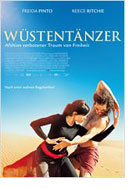

Opening 3 Jul 2014
Directed by:
Richard Raymond
Writing credits:
Jon Croker, Afshin Ghaffarian
Principal actors:
Freida Pinto, Nazanin Boniadi, Tom Cullen, Reece Ritchie, Simon Kassianides
The Islamic Republic of Iran was founded in 1979 under the leadership of Khomeini. Suddenly, partying, drinking, drugs and dancing were forbidden, only to be reanimated as underground activities. Seventeen years later 10-year-old Afshin Ghaffarian was already a promising dancer when the illegal, but so-far tolerated, dance studio of his master Mehdi was finally closed down. We fast forward to Afshin, now a student at the University of Teheran. He still dreams of dance, and adds another forbidden activity to his interests: YouTube. Here he studies the steps of famous dancers such as Michael Jackson and his Moonwalk. He and his like-minded friends, Ardavan, Mehran, Mona and, especially, Elaheh, join him in secret dance practice. Under the motto “Why dance if nobody sees us,” they decamp miles away from Tehran into the desert where, under the eyes of 20 friends, they give a tightly choreographed dance performance. This does not go undiscovered and, in the end, Afshin flees to Paris (much like his idol Rudolf Nurejew many years before), where this Iranian dancer receives a scholarship at the Centre National de la Danse.
Director Richard Raymond rightly says that life is more powerful than fiction, and it is not surprising that, in his debut as director, he chose to film the true story of dancer/choreographer Afshin Ghaffarian, born 1986. Raymond researched many weeks in Paris at Ghaffarian’s school called Réformancesch. For the film choreography he chose Akram Khan, who had been responsible for the opening ceremony of the 2012 summer Olympics in London. He convinced the talented Reece Ritchie to take on the main role. Freida Pinto plays Elaheh and both learned, and then perfected, enough dance steps to be believable. It helps the viewer to know something about recent Iranian history in order to appreciate the difficulties. At the same time, the film supplements our knowledge, including the 2009 election in Iran, as well as life in the university, the role of women, conflicts with the police, etc. Naturally, filming in Iran was “verboten” and therefore Morocco served as an excellent substitute. (Becky Tan)